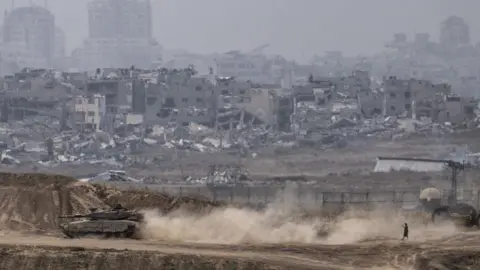Israel revokes decision to shut down Associated Press news agency's Gaza live feed
 Anadolu
AnadoluIsrael has returned broadcasting equipment belonging to the Associated Press, hours after seizing it in southern Israel and shutting down the US news agency's live feed of Gaza.
Communications Minister Shlomo Karhi reversed the decision, which has led to mounting international pressure.
The White House expressed concern, while the Foreign Press Association said it was alarmed by “the latest in a series of chilling steps by the Israeli government to stifle the media”. The UN condemned the move, calling it "shocking".
AP’s vice-president Lauren Easton said it "decries in the strongest terms the actions of the Israeli government".
Mr Karhi said the equipment was confiscated because it was violating a new media law by providing images for broadcasts on the Qatar-based Al Jazeera network, which it has banned.
His recent statement on X read: "Since the Ministry of Defence wishes to examine the matter of the broadcasts from these locations in Sderot regarding the risk to our forces, I have now ordered to cancel the operation and return the equipment to the AP agency, until a different decision is made by the Ministry of Defence."
Mr Karhi claims the images allegedly shared were transmitting "positions of our forces in the northern Gaza Strip while putting them at risk in accordance with security opinions and the government's decision".
Earlier this month, the ministry shut down Al Jazeera's operations in Israel, accusing it of being a "Hamas mouthpiece" and harming national security.
Al Jazeera rejected the allegation that it was and denounced the ban as a "criminal act” that violated human rights. It was also condemned by journalism organisations as a blow to press freedom.
Al Jazeera has continued operations in the occupied West Bank and Gaza Strip, which foreign journalists have been banned from entering since the start of the war between Israel and Hamas in October.
The Associated Press reported that officials from the Israeli communication ministry seized its camera broadcasting a general view of northern Gaza from the southern town of Sderot on Tuesday afternoon.
The officials “handed the AP a piece of paper, signed by Communications Minister Shlomo Karhi, alleging it was violating the country’s foreign broadcaster law”, it said, adding that the agency had rejected a verbal order to cease the live transmission last Thursday.
The agency stressed that it complied with Israel’s military censorship rules, which prohibit broadcasts of details like troop movements that could endanger soldiers.
However, the communications ministry accused the AP of broadcasting footage of Gaza from the balcony of a house in Sderot that included “the activity of Israel Defense Forces combat soldiers and their location”.
"Even though communications ministry inspectors warned them that they were breaking the law and that they should remove Al Jazeera as a recipient of their content and not transfer their broadcast to Al Jazeera, they continued to do so,” a statement said.
"The law and directives do not distinguish between Al Jazeera itself and the suppliers who transfer materials to the [news agency] from Israel."
The AP report quoted Ms Easton as saying that “the shutdown was not based on the content of the feed but rather an abusive use by the Israeli government of the country’s new foreign broadcaster law”.
“We urge the Israeli authorities to return our equipment and enable us to reinstate our live feed immediately so we can continue to provide this important visual journalism to thousands of media outlets around the world,” she added.
White House Press Secretary Karine Jean-Pierre described the report as “concerning” and said it believed journalists had the ability and right to do their jobs.
Israeli opposition leader Yair Lapid said the confiscation of a major US media outlet’s equipment was “an act of madness”.
The Foreign Press Association in Jerusalem warned the seizure would block AP from providing crucial images of northern Gaza to hundreds of the agency's clients around the world.
“Israel’s move today is a slippery slope. Israel could block other international news agencies from providing live footage of Gaza. It could also allow Israel to block media coverage of virtually any news event on vague security grounds,” it added.
Media watchdog Reporters Without Borders accused Israel of “outrageous censorship”.
On 9 May, communication ministry inspectors raided a studio being used by Al Jazeera in the northern Israeli city of Nazareth and confiscated a camera and other equipment.
It came four days after the ministry closed Al Jazeera’s offices in occupied East Jerusalem, stopped the network’s broadcasts on Israeli cable and satellite companies, and blocked access to its websites in Israel.
In April, the Israeli parliament approved a new media law allowing foreign networks considered a threat to national security to be "temporarily" banned for a period of 45 days at a time, which could be renewed.
